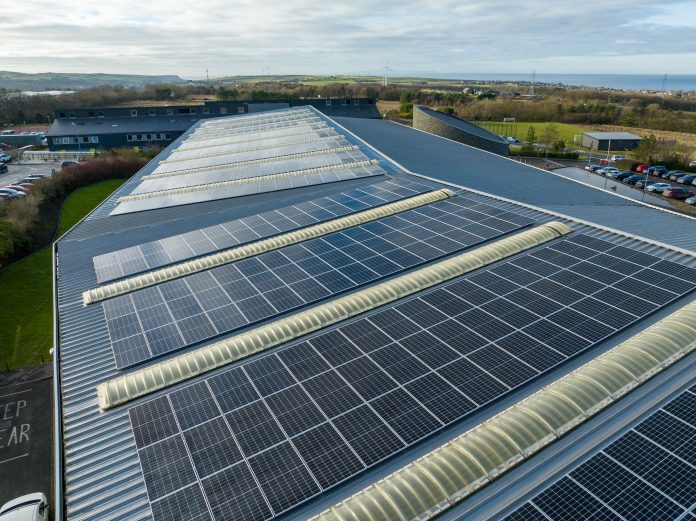Energy Secretary Ed Milliband has relaunched the Solar Taskforce with ambitions for a solar rooftop revolution; James Cunningham, Managing Director at Geo Green Power, explains what this could look like for organisations
An immediate impact on carbon emissions
The dire consequences of climate change aren’t lost on the public sector; councils across the UK and the Local Government Association have declared a climate emergency, and public bodies, alongside industry, are tasked with reaching net zero by 2050.
There is increasing legislative and competitive pressure on the private and public sectors to deliver true sustainability with solid environmental, social, and governance (ESG) strategies. The focus on net zero puts carbon neutrality high on most agendas. This is where solar PV can deliver an immediate impact.
As soon as a solar PV system is commissioned, it starts generating emissions-free energy and reducing your carbon footprint. A relatively small 50kWp solar panel system will save around 12 tonnes of CO2 a year – it’s clear, it’s measurable, and it’s a perfect first step towards your net zero commitment.
Energy that doesn’t cost the Earth
If the carbon savings weren’t enough, there’s even better news: it’s very hard to install solar PV and not save money. During the energy crisis, with spiralling electricity bills, the transition to solar accelerated threefold. Between June 2022 and June 2023, installed solar PV capacity in the UK increased by a massive 1,599MW, 365% more growth than June 2021 – June 2022.
Manufacturers embraced the global surge in demand created by the energy crisis, increasing output to meet requirements. The market has cooled, energy prices have stabilised, but material prices have continued to fall, and solar is now cheaper to install than ever. The commercial scale projects we’ve specified and installed this year are on track to deliver a full payback in the next five years.
With a 25-30-year warranty and a life span that extends far beyond, solar panels generate free energy for decades, delivering electricity bill savings that can be invested elsewhere. When incorporating solar energy into ESG plans, these savings can be allocated to fund longer-term activities as part of an integrated strategy.
Getting started with your solar project
Quite simply, if you haven’t yet investigated solar panels, you should; if you found them too expensive in the past, you should look again. The industry is still young, and the advancements in technology are huge; ten years ago, your roof may have been too small for the size of the installation you require, but panel outputs have increased by at least 50% in that time.
It is important that you seek out a reputable company. Solar panels are a fantastic investment, but they can create serious issues if something were to go wrong. The renewables industry is relatively under-regulated; many certifications are voluntary, and the most recognised MCS scheme only applies to systems of 50kWp or less, although it remains a good indicator that an installer is operating to high standards.
You may need to look outside of existing public sector frameworks, quite simply because companies, such as ourselves, may not have been in a position to join them when they formed.
Installing solar PV requires teams to work on roofs, with electrical power, operate plant and use access equipment. They may also be responsible for the safety of your employees and the public when they are on your site. Look for renewable energy installers with ISO 9001, ISO 14001, NICEIC and CHAS, along with membership of trade bodies such as Solar Energy UK and industry standards including RECC; we also recommend asking for training records, examples of RAMS and talking to existing customers.
Once you have chosen your installer, received a fully costed proposal, and agreed to proceed, it should be plain sailing. Your installer will manage connection agreements. The installation will take a couple of days to a few weeks, depending on size, but daily life can continue as normal. You may need a short power shutdown prior to commissioning, and then you’re up and running.
A focus on education
We are particularly hopeful that Ed Milliband’s plans for a rooftop solar rollout in the public sector will see many more schools experience the huge benefits solar PV offers. We recently installed a 42-panel, 16kWp system for Northgate school in Peterborough, which is now saving 3.5 tonnes of CO2 a year and will see a full return on its investment within three years, delivering savings of over £200,000 in its lifetime. Our project for ENERGUS, a unique conference and training venue in West Cumbria and part of the NDA (Nuclear Decommissioning Authority) estate, enabled it to meet its BEACON project targets and reduce CO2 emissions by 88 tonnes a year with an estimated saving of £4,000,000 over the next 30 years.
Solar provides a huge opportunity for schools; operating hours mirror daylight hours to maximise generation, the long-term energy bill savings can be channelled into much-needed funds elsewhere, and the wider impact on community awareness around renewable energy and climate change is vast. Engaging with the school population and wider community at the time of installation and communicating its ongoing impact will help drive understanding and take up of renewable energy by the next generation.
All in this together
Record temperatures, increased storms and warmer seas point to the fact that climate change is impacting us now, and our children and grandchildren will experience the worst that’s yet to come. We can do something. ESG is increasingly important for our sector, too; we need to do more than simply install products that reduce emissions. Companies that demonstrate a sense of responsibility, accountability, and transparency will emerge as market leaders. We’re embracing our own ESG plan with carbon neutrality and community engagement at its heart; we’re with you on this journey.

This work is licensed under Creative Commons Attribution-NonCommercial-NoDerivatives 4.0 International.











